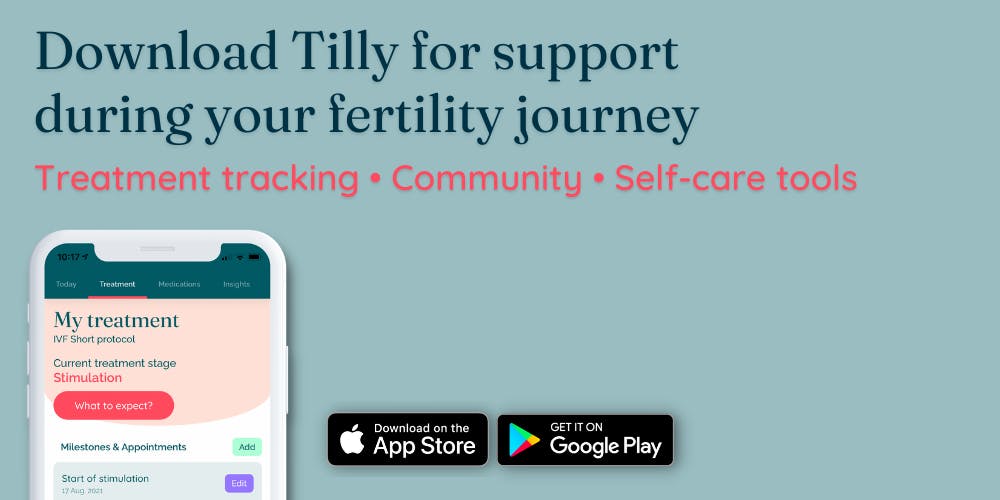When infertility makes you question your identity, or feel like a failure
Infertility can make us question who we are, and who we feel we’re meant to be. These are some examples of questions that might come up:
- I feel like a failure because I haven’t been able to have a child.
- Who would I be if I’m not a parent? Would I ever be okay if I don’t have a child?
- Do I even want a child this badly? Am I the kind of person to invest this much into becoming a parent?
- What does my experience of infertility say about me, my gender, or my worth?
Struggling to conceive often goes hand in hand with self-judgment or even self-hatred. Many say that infertility makes them feel like a failure, which makes sense, as many of us grew up with certain expectations of parenthood - from our cultures, families, and ourselves. It’s often not until we struggle to have a child that we realize how tightly knit with our identity having children really is.
The big scary question that many of us don’t want to ask ourselves is about who we’ll be if we don’t have children. Whether you dreamed of becoming a parent for a long time, or the desire came more recently, finding out that it might not be easy can heighten your feelings of wanting (or needing) to have children. Even if you once dreamed of a dynamic future with lots of goals and pursuits, infertility can give you tunnel vision and make you feel like you’ll never feel fulfilled or complete without a child.
“I got into this habit of calculating at which age random women had their first child to see if I could “beat” them. When I viewed myself from the outside, I could see that it was stupid and just really unhelpful, but I still continued. Finding tools like mindfulness to use whenever the will to do this appeared really helped me stop fuelling my anxiety monster - which was all this was doing for me.” - Karen
Here’s what you can do
1. If you’re feeling like a failure
Think about someone else who has struggled with infertility (someone you know, or a famous person). Do you think of them as a failure? Probably not. You know it’s not their fault. It's more likely that you feel compassion and warmth for them, wishing them nothing but comfort and support.
Now imagine that you could do that towards yourself. Imagine you could be that warm and understanding person - not only for others, but for yourself as well - instead of feeling inadequate and less worthy.
2. If you’re struggling with identity
Breaking free from these identity questions, and finding peace and fulfillment in who you are (and who you’ll be in the future no matter your fertility outcomes), can be difficult. But the truth is that you are a whole person who can find fulfillment in all kinds of ways, if you can learn to be open to it.
Discovering and delighting in your values as a person can help you feel connected with who you are, regardless of what happens with fertility. Either writing in a journal, or speaking with your partner or someone you love and trust, consider:
- When have I been happiest in my life? What contributed to that happiness?
- What am I most proud of?
- When have I been satisfied or fulfilled?
- Who are some people I admire most? What are the qualities in them that I admire?
- How do I want to be remembered?
From there, identify the things that feel most important to you - things that help you feel happy, proud, and fulfilled, and the things that you hold dear. If you can feel centered and grounded in these qualities, you can make choices in your life that help you align with your values. Even though it may not feel like it right now, you are so much more than infertility.
Try these tools in the Tilly app:
- Meditation: Improving self-worth
Experience the power of meditation to help you nurture yourself. - Boost your self-compassion
Learn how to show yourself love and kindness, which can help you get through a difficult experience. - Questioning the voice in your head
When your inner voice is not helping you, learn how to zoom out and support yourself. - Validating your own feelings
Other people don’t always get it. Sometimes, showing yourself validation and support is the best way to nurture yourself.
About the author
Maya Maria Brown, M.A., is an infertility mental health expert. She has a master’s in Counseling Psychology, and has worked with individuals and couples on infertility and relationships. She also has personal experience with infertility and is currently in treatment.
2022-08-25
A mental health app for your fertility journey
Evidence-based self-care tools and facts. Supportive community. Treatment tracking.
Previous articles
Breaking the silence: Infertility and stress during stress awareness month
2025-04-14
Exciting news: Tilly is now part of Rhea
2025-03-31
How infertility impacts men's mental health and ways to cope
2024-11-22
Baby Loss Awareness Week: coming together to support those affected
2024-10-14
PCOS and mental health: a crucial connection
2024-09-25
How to support a friend struggling with involuntary childlessness: A guide for loved ones
2024-09-17
